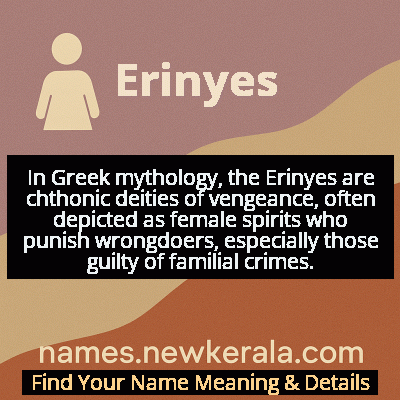Erinyes Name Meaning & Details
Origin, Popularity, Numerology Analysis & Name Meaning of Erinyes
Discover the origin, meaning, and cultural significance of the name ERINYES. Delve into its historical roots and explore the lasting impact it has had on communities and traditions.
Name
Erinyes
Gender
Female
Origin
Greek
Lucky Number
5
Meaning of the Name - Erinyes
In Greek mythology, the Erinyes are chthonic deities of vengeance, often depicted as female spirits who punish wrongdoers, especially those guilty of familial crimes.
Erinyes - Complete Numerology Analysis
Your Numerology Number
Based on Pythagorean Numerology System
Ruling Planet
Mercury
Positive Nature
Adventurous, dynamic, curious, and social.
Negative Traits
Restless, impatient, inconsistent, prone to indulgence.
Lucky Colours
Green, white.
Lucky Days
Wednesday.
Lucky Stones
Emerald.
Harmony Numbers
1, 3, 9.
Best Suited Professions
Sales, marketing, travel, entertainment.
What People Like About You
Versatility, charisma, adventurous spirit.
Famous People Named Erinyes
Erinyes (Mythological Figures)
Greek Goddesses of Vengeance
Three primordial deities who pursued and tormented those who committed grave sins, particularly against family members
Aeschylus' Erinyes
Theatrical Characters
Central figures in Aeschylus' Oresteia trilogy, particularly in 'The Eumenides,' where they transform from vengeful spirits to respected deities
Erinyes in Virgil's Aeneid
Literary Characters
Appear as terrifying figures in Book VII, summoned by Juno to start war between Trojans and Latins
Name Variations & International Equivalents
Click on blue names to explore their detailed meanings. Gray names with will be available soon.
Cultural & Historical Significance
In Aeschylus' Oresteia, their transformation into the Eumenides ('Kindly Ones') marked a crucial moment in Greek cultural evolution, symbolizing the transition from blood feud to civic justice and the integration of ancient chthonic powers into the new Olympian order. This transformation reflected Athens' own development from tribal society to democratic city-state, making the Erinyes central to understanding Greek concepts of justice, family loyalty, and social order. Their worship continued in various forms throughout Greek history, with shrines and cults dedicated to both their vengeful and benevolent aspects.
Extended Personality Analysis
Individuals associated with the name Erinyes are typically perceived as intensely principled, fiercely protective of moral boundaries, and uncompromising in their sense of justice. They possess a strong inner compass that guides their actions, often demonstrating remarkable persistence and determination when pursuing what they believe is right. Like their mythological counterparts, they may exhibit a relentless quality when defending those they feel are wronged or when confronting injustice.
Their personality often combines deep emotional intensity with intellectual rigor, creating individuals who are both passionate and analytical. While they can be formidable opponents when crossed, they also possess a strong protective instinct toward the vulnerable and a deep commitment to maintaining social and moral order. Their strength lies in their unwavering commitment to their principles, though they may need to balance this with flexibility and mercy to avoid becoming overly rigid or punitive in their approach to others. The name suggests someone who takes responsibility seriously and who others might turn to when seeking justice or protection.
Modern Usage & Popularity
In contemporary times, Erinyes is rarely used as a given name due to its strong association with vengeance and punishment. When used, it typically appears in creative contexts - as character names in fantasy literature, video games, or as artistic pseudonyms. The name's usage reflects a growing interest in powerful mythological names, particularly among parents seeking unique, meaningful names with classical roots. However, its dark connotations limit its mainstream appeal. In modern pagan and neoclassical communities, the name might be used more symbolically or spiritually, representing concepts of justice and cosmic balance rather than literal vengeance. The name's rarity makes it distinctive, but its strong mythological baggage means it's usually chosen by those specifically seeking its powerful, if intimidating, associations. It appears occasionally in academic contexts or among classical scholars naming pets or creative projects.
Symbolic & Spiritual Meanings
Symbolically, the Erinyes represent the inescapable consequences of moral transgression and the fundamental principle that certain actions inevitably bring retribution. They embody the concept of natural justice - the idea that the universe itself contains mechanisms to punish violations of fundamental moral laws. Metaphorically, they can represent conscience, guilt, or the psychological torment that follows wrongdoing. In psychological terms, they might symbolize the superego or the internalized voice of societal and parental authority. The transformation of the Erinyes into the Eumenides in Athenian drama also carries profound symbolic meaning, representing civilization's ability to transform destructive energies into constructive social forces. This duality makes them powerful symbols of both the terrifying aspects of justice and its potential for social harmony when properly channeled through civic institutions and psychological integration.

